‘Niet schrikken hoor’, zei ze zacht toen ik op de hoek van de smalle steeg bijna tegen haar aan botste.
Haar man was een paar jaar geleden overleden. In het ziekenhuis verder op de heuvel, waar hij bijna zijn hele leven in het mortuarium gesleten had. Daar hadden ze hem dus ook van binnen leren kennen.
Zijn pensioentje verdiende hij als portier van het sjieke appartementencomplex aan het eind van de steeg. Je kon hem altijd in het roze portiershokje vinden naast die hoge, groene poort. Verdwaalde buurtkinderen, jonge katjes in een doos, keffertjes – waarop gepast moest worden – of visjes in een kom voor de TV met voetbal erop. Hij was er nooit alleen. Nieuwe kleren droeg hij ineens maar een dienstpet zat er niet in. Ook een linkse pensionado had zijn trots.
‘Het gaat nu goed.’ Ik keek haar vragend aan. ‘Een vrouwendingetje’, mompelde ze terwijl ze peinzend voor zich uit staarde. Ze was zijn grote liefde geweest na een eerdere valse start. Twintig jaar jonger en een stuk kleiner. Altijd baantjes in de buurt. Nooit voor lang. Winkelmeisje, schoonmaakster, huishoudhulp, bejaardenverzorgster. En dan weer even niets.
‘Tja’, zuchtte ze. ‘Ik was er laat bij’. Dus hebben ze meteen moeten opereren’.
‘Hier in het ziekenhuis?’ vroeg ik bezorgd. Het stond in de hoofdstad bekender om zijn ligging dan om zijn goede naam.
‘Ja en nu krijg ik elke week een infuus. Het allerergste zijn die zweren in je mond.’
‘Je hebt toch geen uitzaaiingen?’
‘Nee, ze konden niks vinden. Mijn botten waren schoon. Over 6 weken hoor ik meer’.
Met opgeheven hoofd, waarop sprietige stoppeltjes groeiden, opende ze de deur van haar woning.
“The planet is witnessing the appearance of new creatures, ones that have already conquered all continents. At first glance, they seem very delicate and frail but this is an illusion – they are long-lived, almost indestructible: their fleeting bodies won’t decompose for some three hundred more years.
These plastic bags are empty on the inside, and this historic foregoing of all contents unexpectedly affords them great evolutionary benefits”
( Olga Tokarczuk in Flights – Man Booker International 2018)
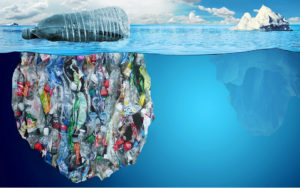 Plastic has proven to be indispensable in our global economy; most is used as packing material. Despite the fact that over 13 million tons of plastic are annually dumped into our oceans – every minute a truckload – the global production of plastic is still on the increase.
Plastic has proven to be indispensable in our global economy; most is used as packing material. Despite the fact that over 13 million tons of plastic are annually dumped into our oceans – every minute a truckload – the global production of plastic is still on the increase.
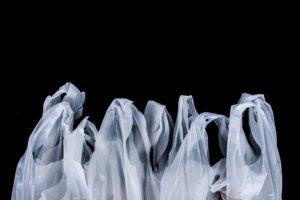 In Europe circa 30% of plastic is recycled.
In Europe circa 30% of plastic is recycled.
If it is up to the Portuguese Parliament plastic bags – as well as plastic packing material for fruit, vegetables and bread – will be forbidden from June 2020.
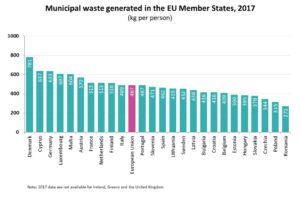 Every Portuguese citizen produces about 480 kg of garbage per year (~ 1,3 kg per day), just as much as the average European. However, the separate collection of paper, glass and plastic in Portugal is still very limited and only 10-15% recycled.
Every Portuguese citizen produces about 480 kg of garbage per year (~ 1,3 kg per day), just as much as the average European. However, the separate collection of paper, glass and plastic in Portugal is still very limited and only 10-15% recycled.
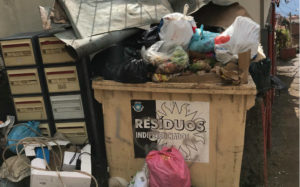 Since the tourist boom some seven years ago, urban waste production in the capital has nearly doubled. Especially downtown – Cais do Sodré, Misericórdia and Bairro Alto, where most tourists stay and the nightlife takes place – garbage accumulates. It leaves no doubt that – besides separation of waste – the frequency of collection services has to be intensified.
Since the tourist boom some seven years ago, urban waste production in the capital has nearly doubled. Especially downtown – Cais do Sodré, Misericórdia and Bairro Alto, where most tourists stay and the nightlife takes place – garbage accumulates. It leaves no doubt that – besides separation of waste – the frequency of collection services has to be intensified.
Another major polluter is the textile industry, the second largest after the oil industry. Although one can nowadays buy a T-shirt and a pair of jeans for almost no money, few people realize the enormous footprint – of nearly 15.000 litres of water – it takes to produce them. The manufactory of clothing has doubled in the last 15 years, whereas its lifespan was halved. Fast fashion rules!
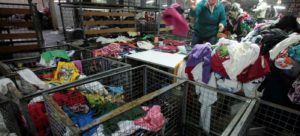 Each year the Portuguese throw away 200,000 tons of textile (~20 kg per person). Although in some places – e.g. Braga –selective collection of textile takes place, the majority of unwanted clothes end up in the incinerator or on the garbage dump.
Each year the Portuguese throw away 200,000 tons of textile (~20 kg per person). Although in some places – e.g. Braga –selective collection of textile takes place, the majority of unwanted clothes end up in the incinerator or on the garbage dump.
Bom fim de semana Enjoy the weekend (pics Sapo/DN/Público)
 Paula Rego, one of the most famous living artists has said the recent anti-abortion movement criminalizes women and believes recent legislation banning the procedure in some US states is dangerously regressive and will force women into finding potentially deadly ‘backstreet solutions’.
Paula Rego, one of the most famous living artists has said the recent anti-abortion movement criminalizes women and believes recent legislation banning the procedure in some US states is dangerously regressive and will force women into finding potentially deadly ‘backstreet solutions’.
The painter – who was born in Portugal but lives in London – has spent her career focusing on women’s rights and abortion. ‘It seems unbelievable that these battles have to be fought all over again. It is grotesque’, she stated.
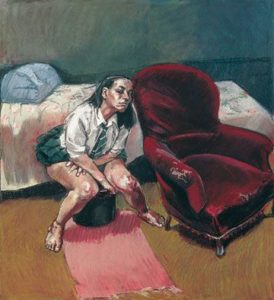 Back in 1998, the now 84-year-old artist created a series of paintings – The Abortion Pastels – in response to a referendum to legalize abortion in Portugal. At that time at least 2 women per year died as a result of secretive and often tortuous illegal abortions. The women who survived the severe bleeding and septicaemia risked 3 years in prison.
Back in 1998, the now 84-year-old artist created a series of paintings – The Abortion Pastels – in response to a referendum to legalize abortion in Portugal. At that time at least 2 women per year died as a result of secretive and often tortuous illegal abortions. The women who survived the severe bleeding and septicaemia risked 3 years in prison.
The referendum was defeated as a result of an intimidating lobby of the ultra-conservative Catholic church and a very low turnout among voters.
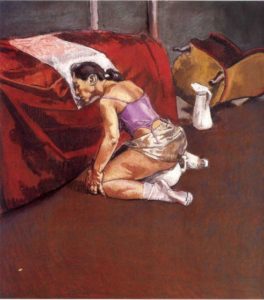 It lasted until 2007 before this mistake was corrected and abortion laws in Portugal were liberalized.
It lasted until 2007 before this mistake was corrected and abortion laws in Portugal were liberalized.
In a provocative interview from that time Rego is very clear about the hypocrisy and horror of the rusty abortion policy in her country. And she is proud that her paintings – highlighting the fear and danger of illegal abortion – were useful as propaganda material in the 2007 referendum. ‘It is imperative women have a choice’, she emphasizes.
Rego’s series depicts a theme uncomfortable in Western art – often only concerned with the idealisation of womanhood. Its cruel realism exposes a very real picture for many – especially poor – women in countries beneath the Equator, where every 9 minutes a woman still dies as a result of an illegal abortion. ‘If you are rich it is easier to have an abortion, usually by travelling to another country. Poor women are butchered.’
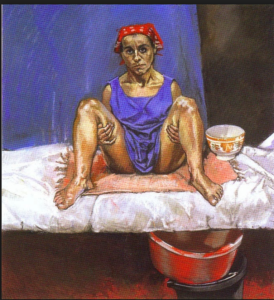 The exhibition Paula Rego: Obedience and Defiance’ will be the first major retrospective of her work since the 1960s. To support the exhibition – that opens on 15 June at MK Gallery in Milton Keynes, UK – the artist has offered a limited edition print from her celebrated series hoping the etching Untitled Abortion, 2000 will help draw attention to the dangers of making abortion illegal again.
The exhibition Paula Rego: Obedience and Defiance’ will be the first major retrospective of her work since the 1960s. To support the exhibition – that opens on 15 June at MK Gallery in Milton Keynes, UK – the artist has offered a limited edition print from her celebrated series hoping the etching Untitled Abortion, 2000 will help draw attention to the dangers of making abortion illegal again.
Bom fim de semana Have a nice weekend (pics Womensart/Sapo)
Interesting links
Pages
Archive
- April 2025
- March 2025
- February 2025
- January 2025
- December 2024
- November 2024
- October 2024
- September 2024
- August 2024
- July 2024
- June 2024
- May 2024
- April 2024
- March 2024
- February 2024
- January 2024
- December 2023
- November 2023
- October 2023
- September 2023
- August 2023
- July 2023
- June 2023
- May 2023
- April 2023
- March 2023
- February 2023
- January 2023
- December 2022
- November 2022
- October 2022
- September 2022
- August 2022
- July 2022
- June 2022
- May 2022
- April 2022
- March 2022
- February 2022
- January 2022
- December 2021
- November 2021
- October 2021
- September 2021
- August 2021
- July 2021
- June 2021
- May 2021
- April 2021
- March 2021
- February 2021
- January 2021
- December 2020
- November 2020
- October 2020
- September 2020
- August 2020
- July 2020
- June 2020
- May 2020
- April 2020
- March 2020
- February 2020
- January 2020
- December 2019
- November 2019
- October 2019
- September 2019
- August 2019
- July 2019
- June 2019
- May 2019
- April 2019
- March 2019
- February 2019
- January 2019
- December 2018
- November 2018
- October 2018
- September 2018
- August 2018
- July 2018
- June 2018
- May 2018
- April 2018
- March 2018
- February 2018
- January 2018
- December 2017
- November 2017
- October 2017
- September 2017
- August 2017
- July 2017
- June 2017
- May 2017
- April 2017
- March 2017
- February 2017
- January 2017
- December 2016
- November 2016
- October 2016
- April 2016
